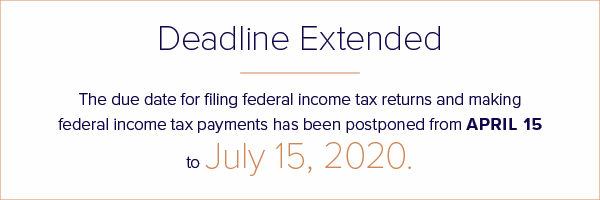On March 20, 2020, the IRS issued Notice 2020-18 in response to the COVID-19 emergency. This provides taxpayers with relief for the 2019 tax season. Under the notice, the due date for filing federal income tax returns and making federal income tax payments that were due on April 15, 2020, has been postponed by three months to July 15, 2020.

The delay of Tax Day has many implications and raises numerous questions. Below, we’ll cover the areas that most commonly impact our clients.
How will interest and penalties be calculated?
The period of April 15, 2020, through July 15, 2020, will be disregarded by the IRS in the computation of any underpayment interest and penalties. However, any penalties attributable to underpayment prior to April 15, 2020, and after July 15, 2020, will still apply, if applicable to your individual circumstances.
Do I need to file an extension?
There is no need to file the official extension Form 4868 or Form 7004 in order to receive this extension. Additionally, there is no limitation to the amount of income tax liability for which payment can be postponed. There had been previous discussions about capping the deferred payment amount at $1MM in tax liability.
Individual filers who are still unable to complete their income taxes by the new July 15, 2020, deadline can file an official extension request to complete them by October 15, 2020. However, this additional extension does not postpone the requirement to pay. As such, an adequate estimate of your tax liability must be calculated and submitted by July 15, 2020, in order to avoid interest and penalties from accruing from that date until the extended October 15, 2020, deadline.
The Notice also postpones to July 15, 2020, the due date for the first quarter 2020 federal estimated tax payments, which are ordinarily due April 15.
IRA contributions.
The deadline for making 2019 tax-year contributions to IRAs, Roth IRA, and health savings accounts (HSAs) has been moved to July 15, 2020, as well.
New York State income tax deadline also moved.
A few days following the IRS Notice, New York State issued guidance that it passed legislation to mirror the federal relief that was put into place. As such, filing and payment of New York State income taxes have been postponed to July 15, 2020, as well.
When is the best time to file?
The postponement of federal and NYS tax filing deadlines provides taxpayers with much-needed relief and flexibility amid the chaos of COVID-19. Depending on your situation, it may be beneficial to file either earlier or later.
- If you are entitled to a refund, you should file your tax returns as soon as possible in order to receive your refund.
- There is no harm in still filing your tax returns by April 15, 2020, even if you have a balance due.
- You can file by April 15 (or anytime thereafter, up until July 15, 2020) and still delay payment of any taxes due until July 15, 2020, without accruing interest or penalties on the unpaid balance.
We’re here to help.
We understand these are stressful and uncertain times. If you have any questions regarding the filing season or your personal income taxes, please do not hesitate to reach out to your Sanderson Wealth Management tax professional. We can guide you through the complexities of the postponement, as well as provide assistance with submitting your 2019 tax documents electronically to ensure prompt completion of your return.
Disclosure
© 2020 Sanderson Wealth Management LLC. This information is not intended to be and should not be treated as legal, investment, accounting or tax advice and is for informational purposes only. Readers, including professionals, should under no circumstances rely upon this information as a substitute for their own research or for obtaining specific legal, accounting, or tax advice from their own counsel. All information discussed herein is current as of the date appearing in this material and is subject to change at any time without notice. Opinions expressed are those of the author, do not necessarily reflect the opinions of Sanderson Wealth Management, and are subject to change without notice. The information has been obtained from sources believed to be reliable, but its accuracy and interpretation are not guaranteed.
Let’s talk about your future.
Schedule a consultation to learn more about our investment services.
Filter Blog Posts
SUBJECT
- Investment Consulting (160)
- Financial Planning (144)
- Tax Consulting (44)
- Estate & Generational Wealth Planning (15)
- Firm News (11)
- Lessons Earned (11)
- COVID-19: Market Watch (10)
- Community (4)
- Philanthropy (4)
- Business Succession Planning (3)
- Prosper Financial Wellness (3)
- Ukraine: Market Watch (1)
AUTHOR
- Angelo Goodenough
- C. Michael Bader, Esq., MBA, CPA, CIMA®
- Caleb Jennings, MBA, CFP®, CIMA®, AIF®
- Cameron Radziwon, LSSBB
- Debbie Todaro
- Evan Kraft, CFP®, CRPC®
- James Warner, MBA, CPA, CFP®, CIMA®
- Joe Bartelo, CPA
- John Gullo, MBA, CFA, CFP®, CIMA®
- John Sanderson, CPA, CIMA®
- Justin Sanderson, MBA, CFP®, CIMA®
- Karen Nicpon, CPA
- Phil Frattali, CFA
- Regyna Waterhouse
- Sanderson Wealth Management
- Tim Domino, CPA, CFP®
- Tucker Weppner, CFP®
